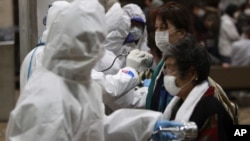The serious radiation leaks at Japan's damaged Fukushima-Daiichi nuclear power plant have reawakened public fears about radiation sickness. But what if there were a drug that could not only protect people from dangerous levels of radiation exposure but also heal those actually exposed to damaging nuclear radiation?
Researchers say they are developing such a drug - one that can both prevent and repair human cell damage from all types of radiation exposure.
Such a healing medication has the potential to lessen panic and fear generated by catastrophic reactor accidents. Plant workers trying to make repairs near a crippled reactor's radioactive core might be less fearful if they could take a pill to repair their own radiation-damaged cells.
Ramesh Kumar, the CEO of a U.S. drug research firm called Onconova, says his company has just such a wonder drug in the works.
The company has been collaborating on the drug, called Ex-Rad, with scientists at a U.S. Defense Department research laboratory. Kumar says early animal trials have been promising.
“Ex-Rad is a drug which is effective in saving a cell damaged by radiation," he says, "and we have found that it can be given in advance of exposure to radiation up to a day ahead or it can be given up to a day after the exposure to radiation.”
There are existing antidotes for radiation exposure which have been approved by the federal Food and Drug Administration (FDA). Potassium iodide, also known as the radiation pill, prevents the body's absorption of the radioactive iodine present in reactor emissions. For a person poisoned by radioactive isotopes such as plutonium and cesium - types of radiation being released from the Fukushima reactors - FDA-approved drugs such as Prussian Blue capsules can quickly flush radioactive elements from the body. However, right now there are no drugs specifically for treating radiation sickness itself.
The Armed Forces Radiobiology Research Institute has been leading the Pentagon's quest for a more effective antidote to radiation sickness, which has a wide range of symptoms.
“The symptoms of acute radiation sickness will be just exactly like a terrible flu," says Col. Andrew Huff, a spokesman for the research institute. "The person would have headache. They would feel very tired. They would have little bit of fever. They might have some vomiting at higher doses all of this and more but at survivable doses it would come on within 24 to 36 hours."
According to Huff, the body loses its platelet and neutrophil supply and people can eventually die of bleeding. He says the Pentagon's search for radiation sickness treatments is intensifying.
“The other more vexing problem, the one that we really have to worry about for larger numbers of people - if there were nuclear terrorism - is how much external ionizing penetrating radiation a person would get after a nuclear detonation."
To combat such a crisis - or to treat people exposed to radiation from a damaged nuclear reactor - the Department of Defense and Onconova have collaborated on the development of Ex-Rad.
“FDA has devised a development path for drugs like Ex-Rad which involves clinical trials, animal studies, and additional controls for manufacturing and we are in the process of completing these studies," says Kumar, whose company is developing Ex-Rad. "We started this process in 2008 under and FDA's Investigational New Drug Exemption. We have carried out clinical studies in human subjects for safety and we are in the process of continuing to do animal efficacy studies so once all of these studies are completed we can get an approval for specific indication. It could be prophylactic use before - or after - exposure. It could be injectable or oral.”
Kumar says Ex-Rad won't be available for at least another two or three years. In the meantime, government officials warn the public to be cautious about the growing number of claims being made on the Internet for anti-radiation drugs that purport to be miracle cures.




